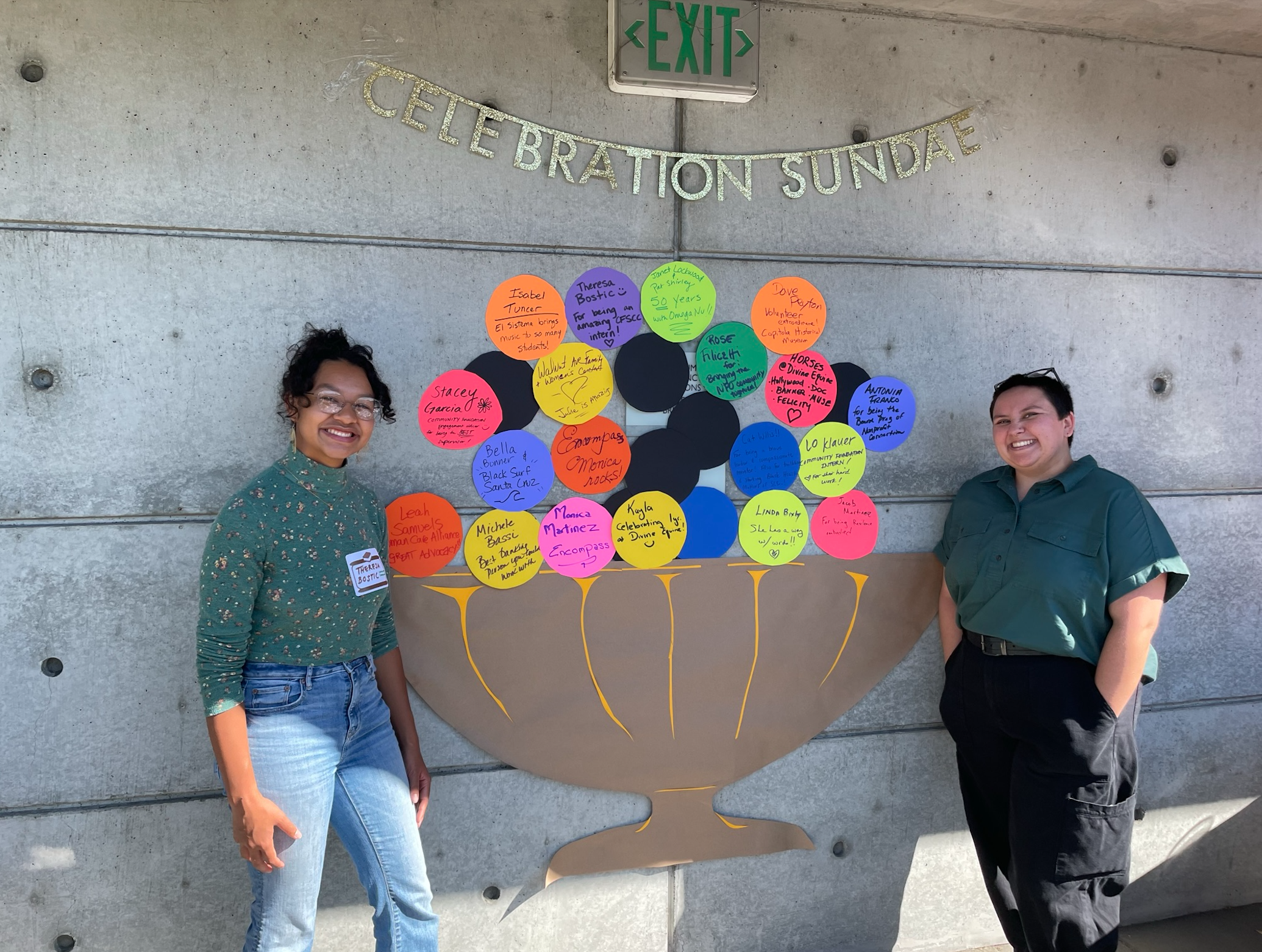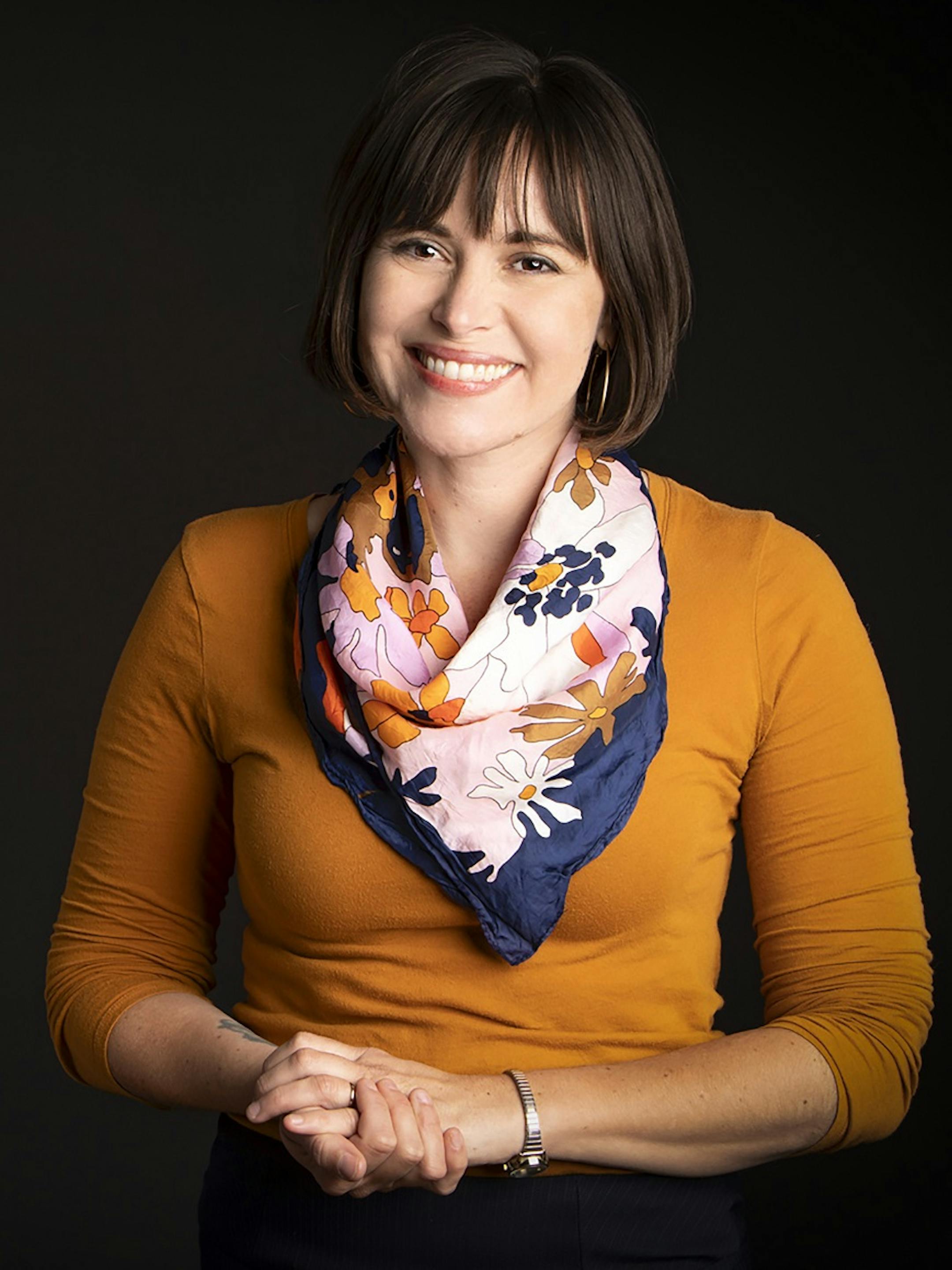Working with the Community Foundation, THI Undergraduate Public Fellows are building a more equitable Santa Cruz County
Undergraduate Public Fellows Gain Experience in Community Building, Programming, and Activism
This year, The Humanities Institute is supporting two undergraduate students through the Public Fellows Program to work with the Santa Cruz Community Foundation, a local nonprofit that connects people, ideas, and resources to inspire equitable philanthropic efforts and “make Santa Cruz County thrive for all who call it home, now and in the future.” THI undergraduate public fellows – Lo Klauer, a senior Feminist Studies major with a Black Studies minor, and Theresa Bostic, a senior double majoring in History and Sociology with a Black Studies minor–are being mentored by Stacey Garcia, Community Foundation’s Engagement Officer, to program events, perform community outreach, and participate in structured conversations with local nonprofit leaders to shape equitable policies and programs.

THI’s public fellowships are giving students an opportunity to connect their humanities studies with hands-on experiences in our community. As Garcia explains, the foundation’s primary focus is to ensure that folks living in Santa Cruz County are able to “get their basic needs met now and in the future, live free from discrimination, and meet their full potential both together and individually.” For Garcia, working towards this goal is about linking local organizations who are already making meaningful equitable interventions with donors who share aligned values. Garcia is excited to have the opportunity to work with UCSC undergraduate students through the Public Fellows Program: “Oftentimes internship positions are not funded, which perpetuates inequities in who has access to on-the job learning opportunities. We are grateful to partner with THI, who connected us with remarkable, ambitious students and fully funded their internship at the Community Foundation.”
Oftentimes internship positions are not funded, which perpetuates inequities in who has access to on-the job learning opportunities. We are grateful to partner with THI, who connected us with remarkable, ambitious students and fully funded their internship at the Community Foundation.
Klauer and Bostic have been an integral part of two projects. The first, Community Foundation’s On The Table series, was a series of monthly conversations organized around themes—climate change, housing, the arts, etc.—where local leaders had the opportunity to share their organizations’ work over a meal with potential donors. After the event, leaders were invited to plan a follow up activity or action in the community so that, according to Garcia, donors could “better connect with the people who are really at the heart of the solutions and build out those relationships.” For Klauer, projects like the On The Table series “speak to the type of intimate work we are doing,” where a more “laid-back, open” approach to community building offers a kind of vulnerability and intimacy that “goes against the traditional model of philanthropy.”
The second project, Rise Together, is a coalition of thirty-two Santa Cruz leaders of color who are working on racial equity across the county. Bostic and Klauer host monthly meetings with these leaders, facilitating conversation, connection, and supporting them to pursue resources and refine action plans. Part of the goal of Rise Together, according to Bostic, is to figure out how to “uplift and advocate for marginalized community members” by including them in the process. For Bostic, this work is so important because “it’s one thing for foundations to have access to resources, but it’s another to actually connect with people in the community and create those direct ties between needs and resources.” For Klauer, participating in Rise Together has also offered a model of “how to actually put equity into practice” through the grant-making process: “Theresa and I were able to listen as local leaders presented their cases for grants, and we got to see the process of making funding decisions.” For Klauer, this is part of a decolonial model of philanthropy where “the dominant power structure of white supremacy” is broken down by making the funding decisions a collective process. In this way, individual competitiveness is supplanted by a shared desire to make meaningful change through “giving support to people who need it and recognizing that not everyone has the same resources or access.”
On Friday, October 14th, the Community Foundation hosted the Rise Together Celebration, an event to celebrate the work of the Rise Together Coalition, featuring speakers, performers, and food. You can see some photos of the event here.

For both Klauer and Bostic, working with the Community Foundation is helping expand their academic studies by providing an example of how they can connect their theoretical and historical expertise with local efforts. Bostic shared that her training in history and critical race and ethnic studies has helped her recognize the importance of “promoting marginalized communities” and those who have been “historically silenced.” She believes that the Community Foundation’s work is one model for how to meaningfully “recognize people’s histories and backgrounds” when making policy and programmatic interventions at the local level. Similarly, Klauer shared that they are able to “bring a feminist studies lens” to their work at the Community Foundation: “It’s been important for me to see how an institution can work on a model other than white supremacy and help everyone feel accepted in that space—recognizing queerness, ethnicity, and ancestry in a way that’s positive and adds to the conversation.”
Garcia, Klauer, and Bostic have built a mutually inspiring relationship through the Public Fellowship program. For Garcia, an important part of the relationship is seeing how Bostic and Klauer are able to “shape some of the direction in the decisions we’ve made about events and programs in a really impactful way.” Garcia encourages other students to seek out similar opportunities through THI’s Public Fellows program because “it’s not just about gaining a great learning and working experience, but it’s also about the opportunity to change the organizations fellows work for to ensure those spaces are relevant and meeting the needs of the younger generation, which helps us grow as a community.”
“It’s not just about gaining a great learning and working experience, but it’s also about the opportunity to change the organizations fellows work for to ensure those spaces are relevant and meeting the needs of the younger generation, which helps us grow as a community.”
For Bostic and Klauer, Garcia is a role model for the kind of de-centered, collaborative leadership they would like to seek out and build in their future careers. Klauer remarked that “Stacey brings such humanity to everything she does. Lots of young folks have anxiety about working with established folks and having a boss, but Stacey allows so much space for work and emotions and this helped Theresa and I feel so supported.” Bostic added that she feels able to lean into the skills she wants to grow because of Stacey’s flexibility: “Stacey has given us a lot of freedom to come up with the ideas as well as facilitate if we want to or do more of the behind-the-scenes work. For me, I’m focused on activity design and more creative projects.” This capacity to lean into the roles they thrive in has created a mutually beneficial collaboration for the interns.
The Humanities Institute is thrilled to set up these opportunities for students. As Saskia Nauenberg Dunkell, THI’s Research Programs and Communications Manager, explains, “It has been absolutely wonderful collaborating with Stacey, and I’ve been so impressed by Lo and Theresa’s projects as inaugural THI Public Fellows at the Community Foundation. This program is part of THI’s concrete commitment to support undergraduate student success at UCSC and beyond, and exemplifies the important work humanities students can do to build a more just and equitable society.”
To learn about more THI Public Fellowship opportunities, visit our page.
THI’s 2022-2023 Undergraduate Public Fellowships are generously supported by the Helen and Will Webster Foundation.
